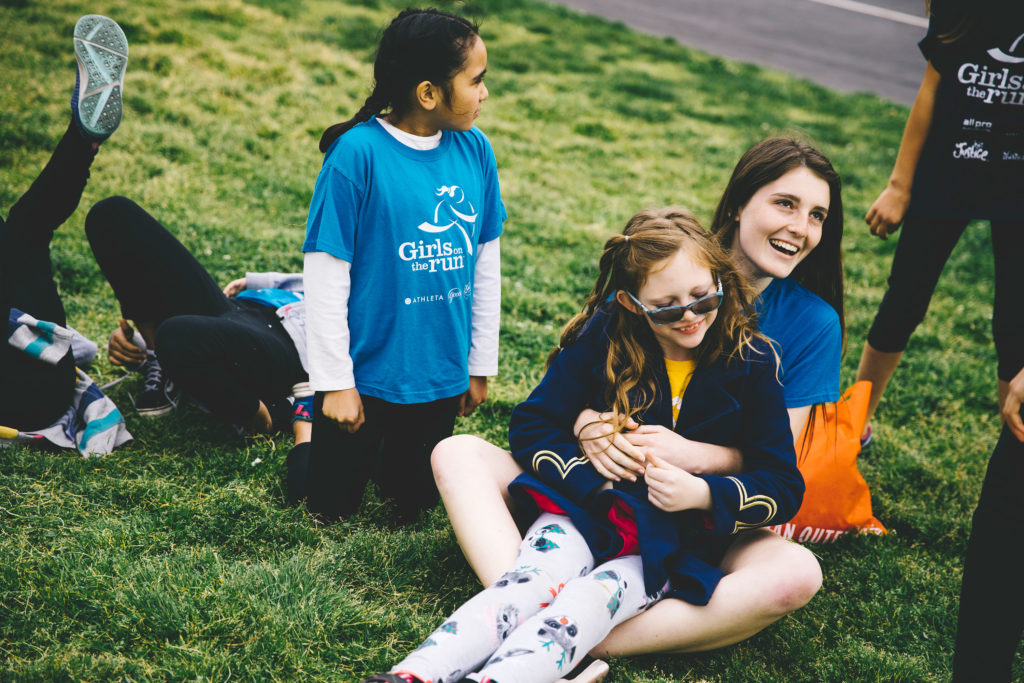
For La Crescenta resident Kenzie Izzard, participating in programs with the sports service organization Girls on the Run was something of a family affair. Her mother was a volunteer and a board member with the organization, and her older sister participated in activities. “I grew up,” the 15-year-old Crescenta Valley High School sophomore said, “going to events.” It was perhaps inevitable, then, that once she started third grade, Kenzie would take part in Girls on the Run as well.
Founded in 1996 in Charlotte, North Carolina, Girls on the Run seeks to inspire and empower young woman through running. Twenty-three years later, the organization operates in all 50 states, serving close to 200,000 students between the ages of 8 and 13. For Kenzie, participation has been a two-fold process. While attending Lincoln Elementary School, she enrolled in the program as a student. After she got to high school, she became a junior coach.
The intention is a simple one: “to encourage positive emotional, social, mental and physical development.”
Girls on the Run programming takes place for an hour and a half, twice a week after school. Each cycle lasts for 10 weeks. Activities start with a warmup and a workout, and students work toward a 5K run. “We would exercise,” Kenzie reflected on her own experience, “but we also had lessons where we’d have a challenge we would have to figure out.” Sometimes, this involved word games. In other instances, it addressed the stresses of growing up and fitting in. “With some activities,” Kenzie explained, “we would run a lap and learn how to work through a stressful situation.” This might involve bullying, peer pressure or negative self-image. “We would run,” Kenzie continued, “with a partner. And as we did, we would talk or role play, like, ‘What would you do if this were happening to you?’”
The intention, according to the organization, is a simple one: “to encourage positive emotional, social, mental and physical development.” Running, it should go without saying, is particularly suited to promote these ideals because it involves working toward a goal. That’s the point of the 5K race, but even more, it’s the purpose of the exercises — or, as Kenzie called them, “the lessons” — that frame each practice session for the kids. “What I learned in Girls on the Run was very helpful,” Kenzie said, “especially in dealing with moving from elementary to middle school in a healthy and positive way.” It’s not that her experience made the adjustment seamless but that the training gave her a set of necessary tools.
Now that she’s a junior coach, Kenzie sees this process through a different filter. She works with 10 third- to sixth-graders at Glenoaks Elementary School in Glendale, and at times, it’s like peering back from the other side of a looking glass. “I remember loving my coaches,” she recalled with a tone of satisfaction. “Now, the girls run and hug me.” Even more important, she feels a deep connection to the students that has to do with having once been exactly where they are. “It’s a great experience,” she elaborated, “because I get to help them, not only with the running but with the social stuff.”
Sometimes, these two areas merge in unexpected ways. If part of the Girls on the Run program involves perseverance, the ability to set and to achieve a goal, another part involves the satisfaction of doing something physical that you didn’t know you could. “It feels good,” Kenzie enthused about her charges, “to see them finish a lap when they said they couldn’t do it. It’s definitely given me a good experience in leadership. When they succeed, it makes me happy and proud.”
David L. Ulin, a frequent contributor to LMU Magazine, is a 2015 Guggenheim Fellow and the author of “Sidewalking: Coming to Terms with Los Angeles” and “The Lost Art of Reading: Books and Resistance in a Troubled Time.” Follow him @davidulin.
This article was published in the spring 2019 issue (Vol. 9, No. 1) of LMU Magazine as a sidebar to a feature story by David L. Ulin titled “Equal Play” about Renata Simril ’93, president and CEO of LA84 Foundation and an additional sidebar titled “Play Works.”
